Key takeaways:
- Pro-life advocacy emphasizes the intrinsic value of every human life and aims to support families and individuals facing challenging choices.
- Effective communication in pro-life discussions relies on empathy, personal stories, and actively engaging with differing viewpoints.
- Engaging in respectful dialogue and acknowledging emotions fosters understanding, even among those with opposing beliefs.
- Building a supportive community is crucial, as shared experiences and collective outreach strengthen commitment and create a sense of belonging.
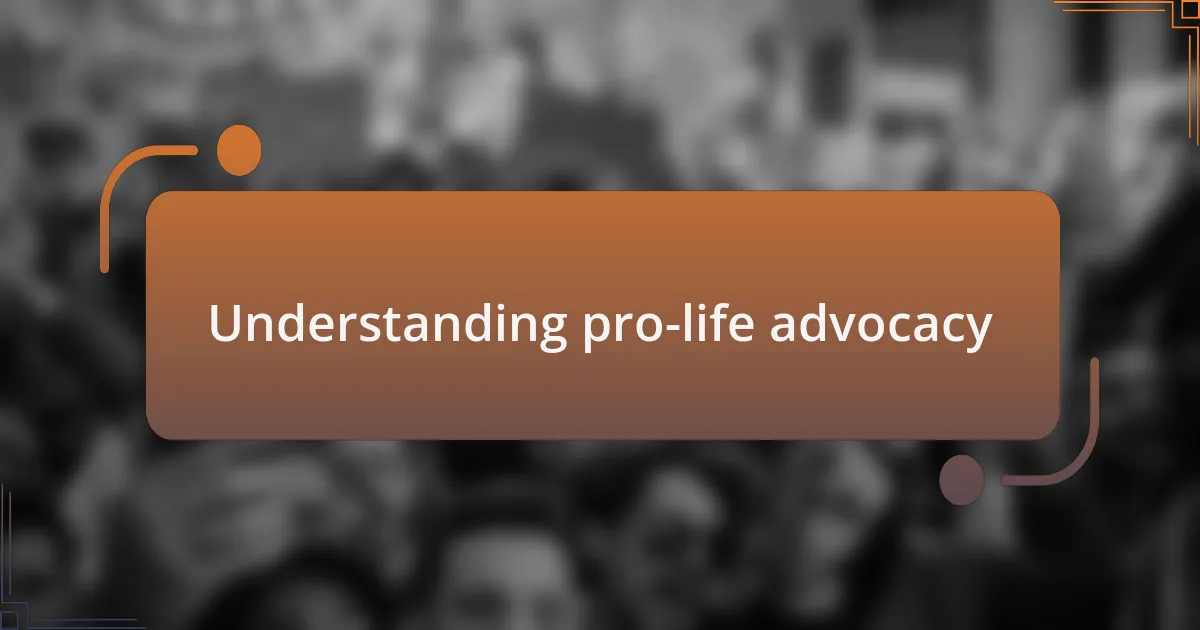
Understanding pro-life advocacy
Pro-life advocacy is rooted in the belief that every human life has inherent value, from conception to natural death. I remember my first experience attending a pro-life rally; the atmosphere was vibrant with hope, concern, and a deep-seated commitment to protecting the most vulnerable among us. Have you ever felt the weight of such responsibility? It’s a powerful realization that drives many of us in this movement.
At the core of pro-life advocacy is the understanding of the fetus as a living being deserving of protection. It’s easy to overlook the humanity of the unborn when discussions become abstract. I often reflect on the stories shared by mothers who faced unplanned pregnancies—many express an immense love for their babies, even before birth. How can we, therefore, ignore that connection and the inherent potential of every life?
Furthermore, pro-life advocacy encompasses broader issues, such as supporting families and addressing social challenges that lead to abortion. I’ve seen firsthand how providing resources and counseling can transform lives. When we frame our discussions around love, support, and community, it invites more than just dialogue—it initiates meaningful change. Don’t you think our focus should also be on uplifting individuals so that they feel empowered to choose life?
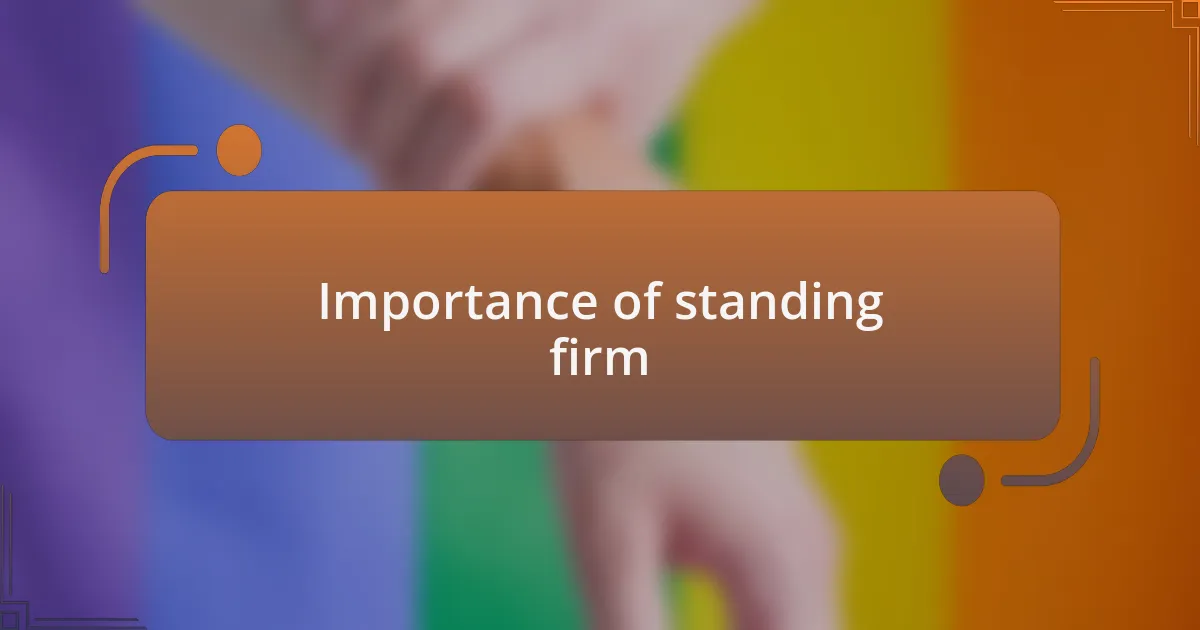
Importance of standing firm
Standing firm in our beliefs is essential, especially in advocacy. I recall a time when a friend questioned my stance on the pro-life issue. Instead of feeling defensive, I took that as an opportunity to engage in a respectful dialogue. By firmly standing my ground and articulating my views, I was able to share not just facts but emotional narratives that truly resonated with them. Have you experienced moments where your confidence in your beliefs sparked thoughtful conversations?
When we stand firm, we send a powerful message to those around us. I remember attending a community discussion where individuals shared their stories of hope and heartache. The strength they exhibited by standing firmly in their convictions created an environment of respect and understanding. It reinforced my belief that when we confidently embrace our principles, we naturally inspire others to reflect on their own beliefs. How many lives can we touch simply by being unwavering in our commitment?
Moreover, standing firm serves as a beacon for those who may feel lost. I once met a young woman who was uncertain about her pregnancy. She mentioned how hearing others talk passionately about life made her reconsider her options. It reminded me that our commitment doesn’t just shape our paths; it can also illuminate the way for others. Isn’t it remarkable how our resolve can pave the way for someone else’s transformation?
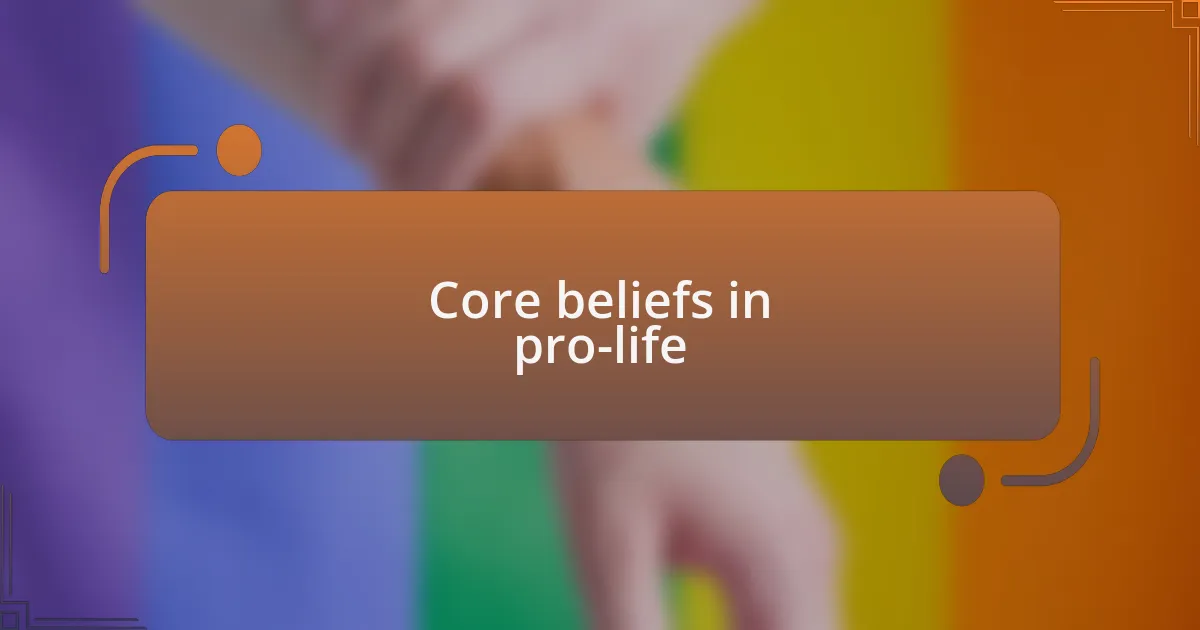
Core beliefs in pro-life
Core beliefs in pro-life are deeply rooted in the understanding that every life has intrinsic value. I often reflect on a moment when I heard a heartbreaking story from a woman who chose life despite immense pressure to consider alternatives. Her experience not only affirmed my belief in the worth of every unborn child, but also highlighted the importance of support for expectant mothers. How can we not value lives that have the potential to change the world?
Another core belief centers around the idea of choice, but I see it as a choice for life rather than a choice to end it. In conversations with friends, I often emphasize that empowering women means providing the resources and education to make informed decisions. I recall sharing a powerful interaction with a young woman who felt trapped in her circumstances. After discussing alternatives and the support available, she felt a renewed sense of hope. Isn’t it incredible how offering a perspective of life can shift someone’s entire outlook?
Lastly, I believe in fostering a community that stands united in advocating for life. I remember attending a rally where the energy was palpable, filled with people from various backgrounds sharing their stories of hope and resilience. In that moment, I felt a tremendous sense of solidarity among everyone present. Doesn’t it inspire you to see how coming together strengthens our resolve and amplifies our voices in this vital cause? Each story shared not only reinforces our beliefs but also creates a profound impact on those around us.
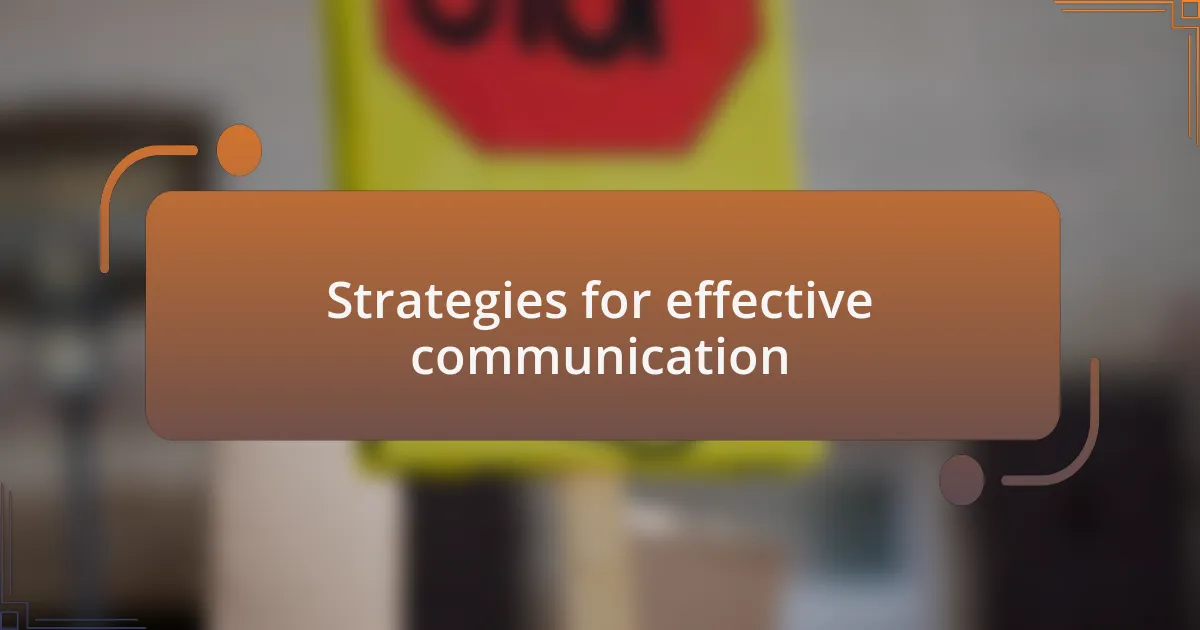
Strategies for effective communication
To communicate effectively about pro-life beliefs, it’s essential to approach discussions with empathy. I had a conversation with a friend who originally had a completely different viewpoint. Instead of dismissing her beliefs, I listened carefully, which allowed me to tailor my message in a way that resonated with her. Isn’t it fascinating how understanding another’s perspective can pave the way for meaningful dialogue?
Using personal stories can also significantly enhance communication. I remember sharing my own experience of volunteering at a crisis pregnancy center, where I witnessed firsthand the impact of compassionate support on women facing difficult choices. This not only illustrated the importance of community help but also humanized the issue for those I spoke to. Have you noticed how a relatable story can make an abstract concept feel immediate and real?
Lastly, stay open to questions and discussions that might challenge your views. I often find that when I invite questions about my beliefs, it leads to deeper conversations rather than heated debates. I recall a time when a thoughtful inquiry from a skeptic prompted me to reflect and refine my views. Isn’t it rewarding to engage in a dialogue that encourages growth and understanding for everyone involved?
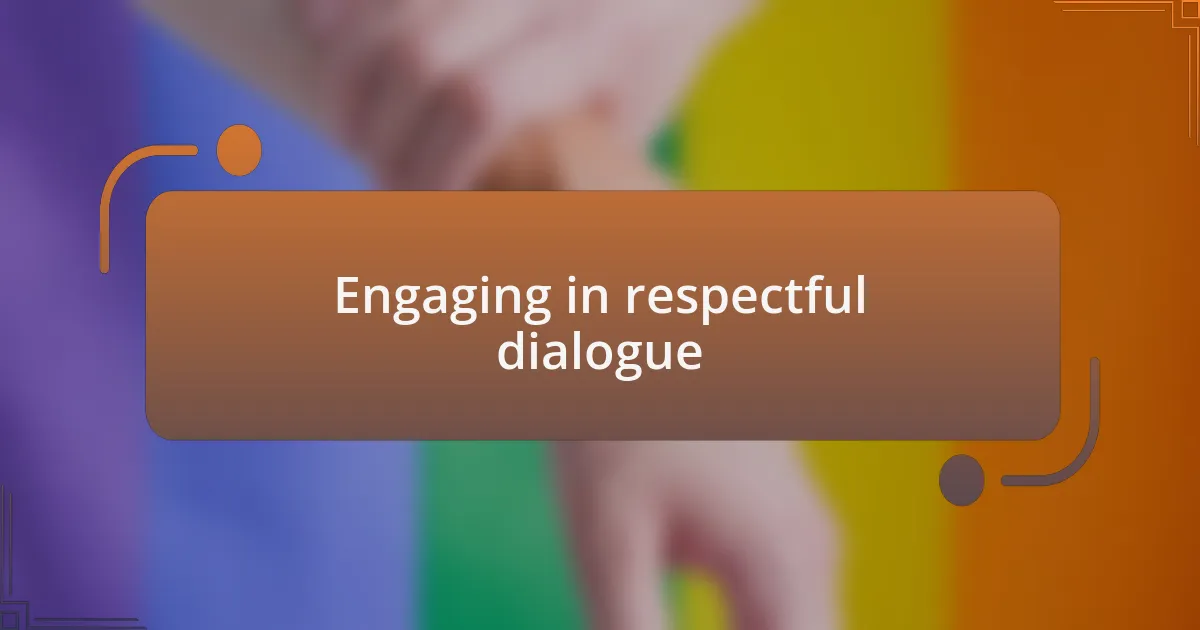
Engaging in respectful dialogue
Engaging in respectful dialogue means valuing the opinions of others, even when they strongly differ from your own. I recall attending a community forum where a fierce debate erupted. Instead of firing back with counterarguments, I noticed the power of pausing to ask clarifying questions. This simple approach not only defused tension but also highlighted common ground we could discuss further. Have you ever realized how crucial it is to seek clarity rather than just to respond?
Listening actively can transform conversations about sensitive topics. I remember chatting with a colleague who had opposing views on the pro-life issue. Instead of interjecting with my stance, I focused on really hearing her concerns. By doing so, I discovered shared values, like the importance of family and care for those in need. Isn’t it incredible how listening can create bonds, even among those who disagree?
Moreover, I’ve found that acknowledging emotions can be vital in discussions around pro-life beliefs. During a recent discussion with a friend, she expressed her fears about women’s healthcare. Rather than discounting her feelings, I validated them. I shared my own initial uncertainties when I first embraced the pro-life cause. This openness created a safe space for her to express her views, transforming our conversation into a constructive dialogue. Don’t you think that making people feel heard can turn a contentious debate into a deeper exchange?
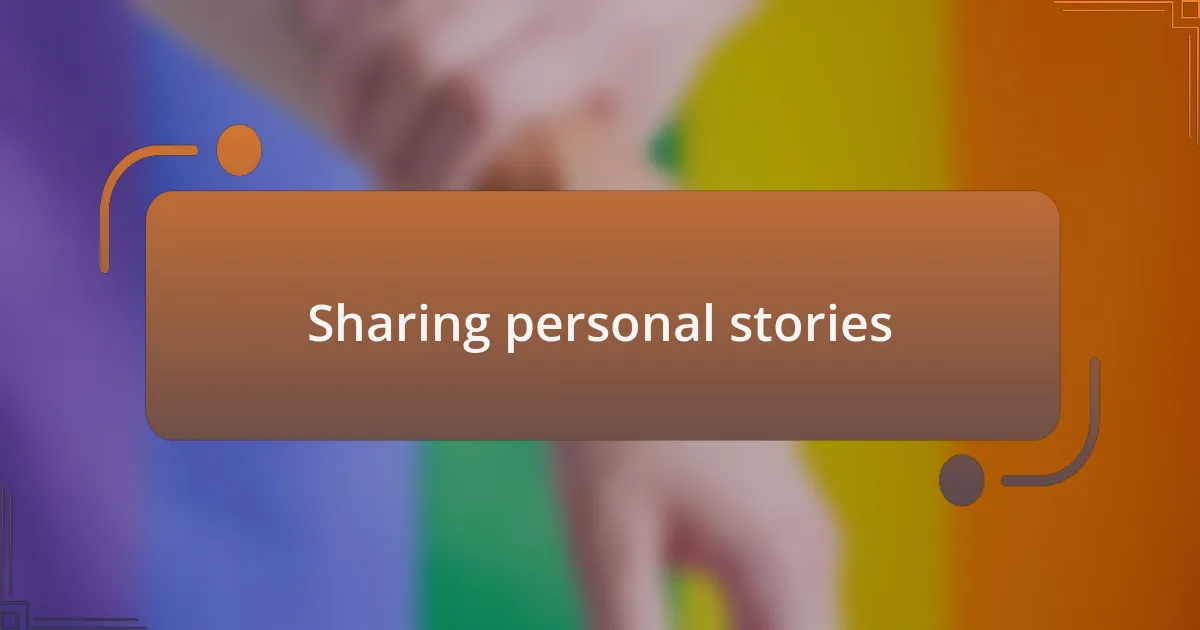
Sharing personal stories
Sharing personal stories can be a powerful tool in the pro-life discussion. I remember when a friend courageously shared her experience of choosing adoption for her unexpected pregnancy. Her heartfelt narrative not only illuminated the complexities of her decision but also sparked reflections in me about the choices many women face. Have you ever pondered how a single story can shift perspectives?
I’ve also seen how sharing my own journey can resonate deeply with others. During a small gathering, I recounted my experience volunteering at a crisis pregnancy center. The stories of women I met there—filled with hope and fear—were not just tales; they were life-changing moments that strengthened my resolve. Isn’t it fascinating how our experiences can serve as bridges to understanding rather than barriers?
Sometimes, I realize that vulnerability in sharing can draw people in. Once, while discussing beliefs at a dinner table, I opened up about my struggles with the pro-life stance amid societal pressures. As I spoke about my doubts, I invited others to share their feelings. In that atmosphere of openness, we connected on a human level, navigating this sensitive topic together. Don’t you think sharing our stories can foster empathy and understanding, transcending our differing views?
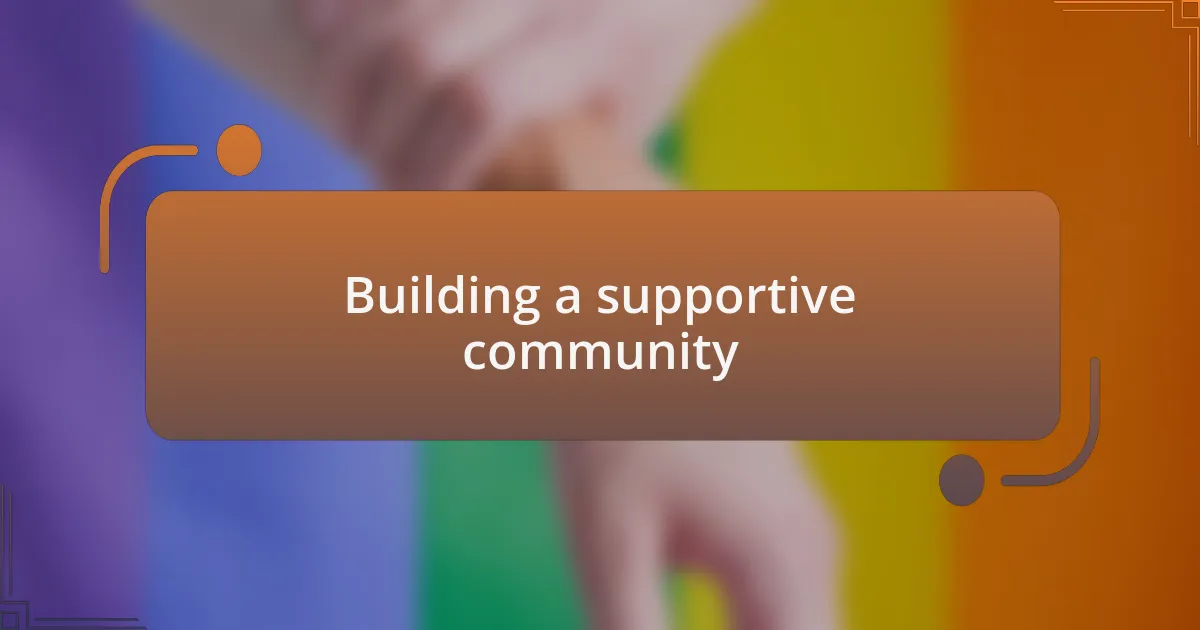
Building a supportive community
Creating a supportive community is essential for nurturing our beliefs in the pro-life movement. I remember attending a local pro-life group meeting where we all shared our triumphs and struggles. Listening to others express their experiences made me feel like I belonged to something bigger, a network built on shared values and mutual support. Have you ever felt that sense of unity?
One memorable moment for me was when a peer organized a community outreach program. It wasn’t merely about distributing pamphlets; it was about connecting with families and letting them know they weren’t alone in their journeys. Witnessing firsthand the gratitude from those we reached out to reinforced my belief that support goes beyond words—it’s about taking action together. Doesn’t it feel empowering when we know our presence can make a difference?
I’ve also found that engaging discussions foster a deeper sense of community. Once, during a small book club focused on pro-life literature, we debated various perspectives, and it was eye-opening. I realized that our differing viewpoints brought depth to our conversations, helping us refine our beliefs. Isn’t it incredible how collective dialogue can not only strengthen our positions but also forge lasting friendships?